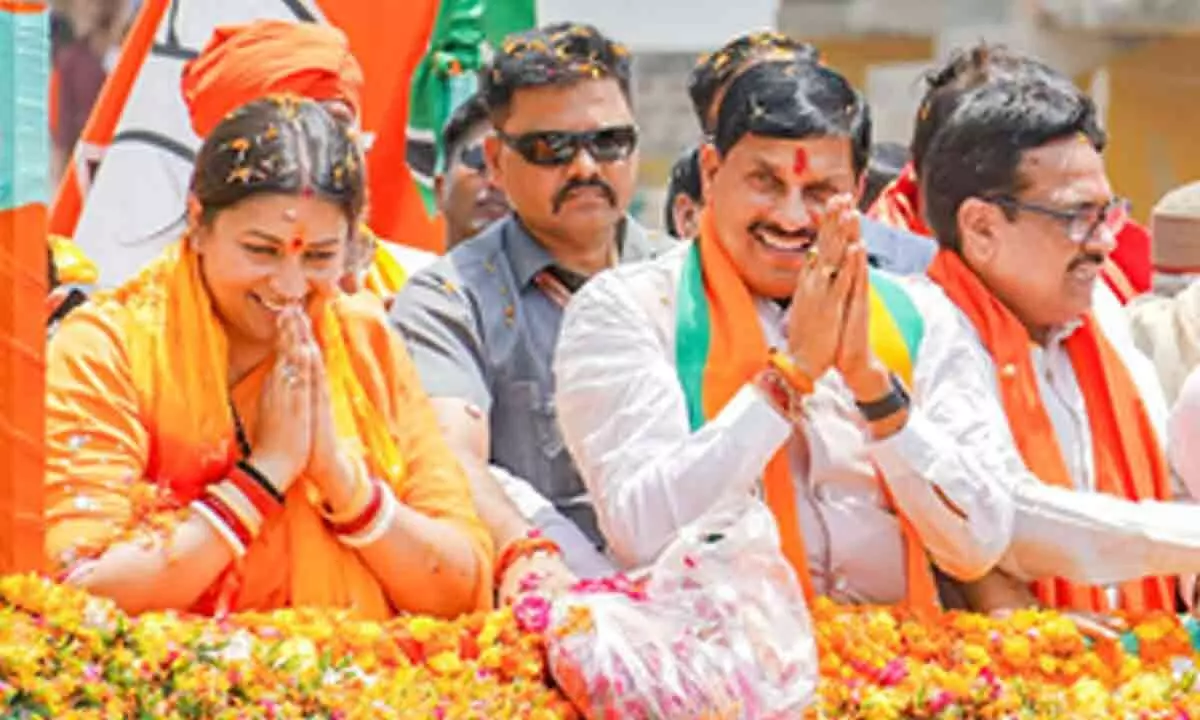Live
- 'Lone wolf' was behind shooting of Slovakia's Fico, says minister
- Sudan denies reports of visa denial to US envoy
- Slovakian PM Fico remains in 'serious' condition after assassination attempt
- After Ram Temple, monument honouring Sita will be built by PM, says HM Shah in Sitamarhi
- India PC market grew 2.6 pc in Q1 with over 3 mn units shipped: Report
- Covaxin shows excellent safety track record: Bharat Biotech on study citing risks
- Viksit Bharat Ambassador: From rail tracks to stations revamp, Ashwini Vaishnaw explains transformation in Railways
- F1: Newey expects to join new team at the end of season
- 1 in 3 people die of heart disease due to buildup of fats, cholesterol
- CM Kejriwal, AAP to be named in supplementary charge sheet: ED to Supreme Court
Just In
Political Prowess on Display: Rajnath Singh and Smriti Irani's nominations galvanise BJP’s poll campaign

The simultaneous filing of nominations by two prominent Union Ministers and senior BJP leaders, Rajnath Singh from Lucknow and Smriti Irani from Amethi, for the Lok Sabha elections marks a significant political development, particularly in the context of Uttar Pradesh, a state that often serves as the bellwether for national political trends.
New Delhi : The simultaneous filing of nominations by two prominent Union Ministers and senior BJP leaders, Rajnath Singh from Lucknow and Smriti Irani from Amethi, for the Lok Sabha elections marks a significant political development, particularly in the context of Uttar Pradesh, a state that often serves as the bellwether for national political trends.
Lucknow and Amethi are scheduled to go to the polls in the fifth phase on May 20, for which the nomination process commenced on April 26. By filing their nominations early, Rajnath Singh and Smriti Irani have signalled their intent to lead from the front and set the tone for their respective electoral campaigns.
The high-profile nominations on Monday carry significant implications, not only for the constituencies they represent, but also for the broader national political narrative.
It needs to be underlined that the BJP strategists thought it prudent to have Uttarakhand Chief Minister Pushkar Singh Dhami accompany Rajnath Singh when he filed his nomination papers. UP Chief Minister Yogi Adityanath’s presence added further gravitas to the occasion.
The Lucknow parliamentary constituency has a good number of voters with their roots in Uttrakhand.
Similarly, in Amethi, Madhya Pradesh Chief Minister Mohan Yadav accompanied Smriti Irani during the nomination filing process and the roadshow that followed.
Rajnath Singh, the seasoned politician and incumbent Defence Minister, choosing to contest from Lucknow underscores the BJP’s strong base in the state capital.
Lucknow has been a bastion of the BJP for decades, and Singh's candidature from this constituency reaffirms the party's confidence in its traditional support base. Singh's political acumen and stature within the party make him a formidable candidate, capable of retaining the seat for the BJP.
Moreover, his presence in the high-profile constituency not only consolidates the BJP's position in Uttar Pradesh, but also sends a strong message to the electorate about the party's commitment to governance and national security.
Rajnath Singh is contesting the Lok Sabha polls from Lucknow for the third time. He won the seat with landslide margins in 2014 and 2019.
On the other hand, Smriti Irani's candidature from Amethi, a constituency that was once considered a Congress stronghold, reflects the BJP's aggressive expansion strategy and its ambition to challenge the established political dynasties.
Irani's spirited campaign in the 2019 Lok Sabha elections, when she emerged as a strong contender against Rahul Gandhi, laid the groundwork for the BJP's significant electoral gains in the region.
She had defeated the Gandhi scion who was the sitting MP by about 55,000 votes in 2019. It was seen as a remarkable comeback by Smriti Irani, as she had lost to Rahul Gandhi from Amethi in the 2014 Lok Sabha elections.
By contesting from Amethi once again, Irani aims to consolidate the gains made by the BJP in the last elections and further strengthen the party's presence in this historically significant constituency.
Her nomination from Amethi not only symbolises the BJP's commitment to grassroots politics, but also underscores its efforts to break the stranglehold of entrenched political families.
At the same time, anticipation mounts over Rahul Gandhi’s decision to contest or not contest from Amethi.
The political discourse surrounding the constituency has been invigorated by Irani's nomination.
Rahul Gandhi represented Amethi from 2004 till 2019. His father Rajiv Gandhi represented the seat from 1981 till his death in 1991. Sonia Gandhi also successfully contested elections from here in 1999 before passing the mantle to Rahul Gandhi in 2004.
Meanwhile, beyond the symbolism and electoral calculations, the candidatures of Rajnath Singh and Smriti Irani also raise pertinent questions about the BJP's broader political strategy. Political analysts say the decision to field two heavyweight ministers from different constituencies underscores the party's recognition of the importance of individual personalities in electoral politics.
Furthermore, the simultaneous filing of nominations by Rajnath Singh and Smriti Irani understandably highlights the BJP's emphasis on geographical and social diversification in its electoral strategy.
While Rajnath Singh represents the urban elite and the party's traditional support base, Irani's candidacy in Amethi signals the BJP's outreach to rural and semi-urban voters, especially the women and youth. There is no denying that this multi-pronged approach not only broadens the party's appeal, but also enhances its prospects of success in an increasingly competitive political landscape.
As the electoral battle heats up in the coming weeks, all eyes will be on these two heavyweight ministers as they seek to secure victory for the BJP and further consolidate its position on the national stage.
Their candidacies not only represent the aspirations and expectations of their respective constituencies, but also reflect the broader aspirations of a nation in transition, seeking leadership and direction in an increasingly complex and interconnected world.

© 2024 Hyderabad Media House Limited/The Hans India. All rights reserved. Powered by hocalwire.com






